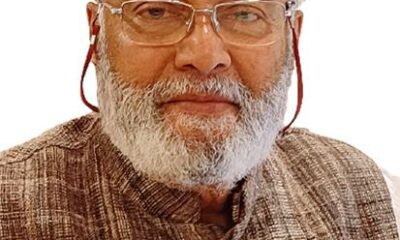National Issues
Education: The Key that Unlocks the Golden Door to Freedom -By Adegboye Shalom
The state of education in Nigeria has been a cause for concern with various issues like; insufficient funding, outdated curriculum, poor teacher quality and poor facilities being some key areas facing the sector. It is however also very redeemable with improvement opportunities. Addressing these problems will advance the country and improve its education system.

George Washington Carver said and I quote, “Education is the key that unlocks the golden door to freedom.” Nelson Mandela, a former president of South Africa also said, “Education is the most powerful weapon which you can use to change the world.”
Education plays a significant role in the development of any nation, Nigeria included. Unfortunately, it is very obvious that the state of education in Nigeria is not very palatable, with only about 59% of the adult population being able to read and write.
So, I will discuss some of the problems associated with Nigerian education system and the open possibilities for improvement.
Educational challenges in Nigeria
- Poor facilities or Infrastructure: A large number of schools in Nigeria (especially government schools), lack adequate facilities ranging from good chairs, desks to a working school laboratory, e.t.c.
Many schools also lack basic services which include steady electricity and water supply. This makes it hard to provide quality education.
- Poor Teacher Quality: In the Nigerian educational system, a lot of teachers do not have the required credentials and qualifications. It therefore may manifest in form of their lack of subject knowledge, unprofessional behaviour, poor classroom control, e.t.c.
Also schools in rural areas do not have the necessary manpower needed to educate their students populace.
- Insufficient Funding: Insufficient funding is another major issue encountered in Nigerian education. In 2021, 26 per cent of the government budget was allocated to education and only about 6.7 per cent was remitted.
Insufficient Funding in the long run leads to inadequate facilities, lack of resources, reduced teacher salaries which will definitely not encourage them to take their jobs seriously.
- Curriculum Problems: The Nigerian educational system’s curriculum has been castigated for being obsolete and immaterial to the country’s needs. It seems as though no effort has been made to review the current curriculum in Nigeria, and as such we have graduates who have no idea on how to apply what they have learnt in school to life. Basically because they cannot be applied.
These are problems that if addressed, can bring up the educational sector of the country. Possible options for improvements are:
- Good facilities: Schools should endeavour to make better use of their finances and available resources to ensure good and stable learning environment. Having about 300+ students in a small and poorly ventilated classroom is very unhealthy and unhygienic.
Water and electricity supply should also be made available and steady as these are very essential in delivering quality education.
- Effective Teacher Training: There is a need for investment in teacher training and development. School authorities must ensure that teachers have the necessary qualifications to deliver sound education.
- Increased Government Funding: The Nigerian Government had the obligation to fulfil its said allocation to the educational sector. These funds must also be used productively and competently. This will boost education in Nigeria significantly.
- Curriculum Amendment: In many countries, general curriculum review takes place every five years while individual changes may take place due to a new research breakthrough.
The Nigerian government needs to revise and modernize the education curriculum to guarantee it matches the country’s needs. The need for change in the curriculum is due to how fast the societal needs are changing and we must keep up with it.
There are educational foundations/institutions which help to support education in Nigeria. They include: United for Education (U4E), Whitefield Education, WADA Foundation and many more. They aim to raise funds, provide scholarships and grants.
There are also NGO’s willing to train teachers and other school staffs to improve education quality and lessen barriers to school attendance.
Conclusion:
The state of education in Nigeria has been a cause for concern with various issues like; insufficient funding, outdated curriculum, poor teacher quality and poor facilities being some key areas facing the sector. It is however also very redeemable with improvement opportunities. Addressing these problems will advance the country and improve its education system.
In this information age, the world is changing faster than before. Development in the educational sector will prove to be a very big step in the changing of the country’s status.
Adegboye Shalom, a student of Delta State University, Oleh Campus.










